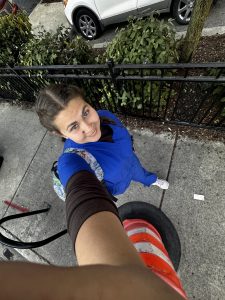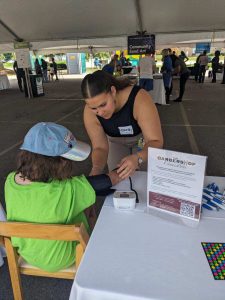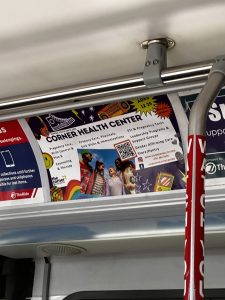After attending Second Look at Michigan (SL@M), it was clear that the University of Michigan Medical School was the place for me to pursue my medical education. However, the beginning of my medical school journey was bittersweet.
As it is for many matriculants, I had spent most of my life working towards becoming a physician, but I found myself not wanting to leave the life I had built for myself in DC. I was passionate about my work at the DC Primary Care Association (DCPCA) and had fallen in love with DC’s culture and pace of life. Collaborating with DC’s Federally Qualified Health Centers was immensely fulfilling, and I was sad to leave my projects, especially the initiatives that aimed to improve the holistic wellbeing of DC’s underserved patients.
Moreover, I had never lived in Michigan before, and I wasn’t sure where to start when it came to learning about the health infrastructure of my new community. I was intimidated by the prospect of starting over, both personally and professionally, in a new place. Crazily enough, it was a chance bus ride to West Ann Arbor that put my worries to rest and helped me get involved with the community health work that I hoped to continue upon moving to Michigan.
On June 16th, my best friend and I drove a U-Haul stuffed to the brim with everything I own from DC to Michigan. I moved here a couple months before starting school because I knew that I would need time to settle into my new life. For me, a huge part of feeling at home in a new place is exploring my community, so I made it a point to take public transit and visit different community gathering spaces around town. Some early-July day, while taking the bus to one of Ann Arbor’s district libraries, I happened to sit directly across from an advertisement for the Corner Health Clinic. It was a vibrant flier, with lots of playful icons and smiling faces. It stated that the clinic was a community health center that provided primary care to young folks in the Ypsilanti community. The flier also listed the clinic’s services, and two caught my attention: the community pantry and gender-affirming care.

A commemorative selfie to celebrate my first shadowing experience as a medical student.
Fortuitously, the clinic manifested in my life again a few weeks later, when Dr. Emad Abou-Arab, who happens to work at Corner Health Clinic one day a week, came to speak with the LEAD cohort about practicing medicine after the pandemic. During his talk, he spoke about his passion for community health. He described how difficult it is for physicians to operate within the strict, arbitrary confines that insurance imposes on the provision of health care. He shared with us some of the strategies he uses to work around these issues and improve his patients’ ability to access care. Dr. Abou-Arab exemplifies the kind of physician and advocate I hope to become, so I reached out to him and asked if I could shadow him at Corner Health. He agreed and said he was excited to have me join him in the clinic. I took the bus over to Ypsilanti and we spent the morning seeing patients.
Genevieve Mulligan, a fourth-year medical student applying into family medicine, was also at the clinic that day as part of her clinical rotations. At the beginning of the day, Dr. Abou-Arab invited Genevieve to “run the show.” I accompanied Genevieve to the patient room and observed her perform the interview. It was inspiring to see Genevieve ask insightful questions and invite the patients to speak on all aspects of their health. Genevieve has an incredible passion for family medicine and is a generous peer mentor and teacher, who fervently shared her knowledge with me. After concluding the patient interview, we then returned to the office, reported our findings to Dr. Abou-Arab, and developed a preliminary course of action, making sure to consider the patient’s unique circumstances. All three of us then entered the patient room to collaborate with them to finalize the treatment plan.
Though I have been interested in gender-affirming care for many years, this was my first real clinical experience with this branch of medicine. It was rewarding to see how relieved and excited the patients were to be receiving hormone replacement therapies. It was amazing to see that Ypsilanti community members could not only get their primary care needs addressed at the clinic, but also receive life-saving treatments that have historically been withheld (and, in some states, continue to be) from patients. It was also meaningful to think about the impact that receiving these treatments would make on the patients’ emotional wellbeing on a daily basis. Unfortunately, identities are frequently forced upon us. Holding identities that aren’t readily apparent to others can be painful because society places us in boxes that don’t always match the ones that we would choose for ourselves. For this reason, there is indescribable power in reclaiming one’s ability to define their own selves and impact how they are perceived by those around them. I am glad that places like the Corner Health Clinic exist because every time that a patient who is transitioning takes a dose of their medication, they are moving forward in their journey to embodying the person who they know themselves to be.

Volunteering at the Packard Health Fair, another community health opportunity I’ve gotten the chance to be a part of since becoming a medical student at UMMS.
After we finished seeing patients, Genevieve and I went to the bottom floor of the clinic, where the community pantry is housed. It offers healthy foods, baby clothes, toiletries, and basic household necessities for free to Ypsilanti’s youth. While working at DCPCA, I learned that medical care alone does not make a significant impact on a patient’s health if their basic needs, like housing, food, and safety, are not being met. Therefore, health care providers must consider these external determinants of health and provide wraparound care and integrated resources that work beyond patients’ medical needs to ensure their physical and emotional wellbeing. In-house services like the clinic’s community pantry help do exactly that.

The ad that I saw for the first time in July and again on my way home from shadowing Dr. Abou-Arab at the Corner Health Clinic.
At the end of the morning, I thanked Dr. Abou-Arab and Genevieve for their time and enthusiasm for helping me learn. I got on the bus back to Ann Arbor and upon taking my seat, I saw something colorful out of the corner of my eye. You wouldn’t believe me if I told you that I found myself sitting across from the very Corner Health Clinic flier that I had seen on my bus ride to the library in July.
The word that best encapsulates my time so far at UMMS is serendipity. Though it was hard to leave DC, a series of chance interactions have catapulted me into incredible opportunities that make me feel as though I am exactly where I am supposed to be, and I am grateful for that.
Don’t miss the next Dose of Reality.
Kennedy S. Miller (she/hers) is a first-year medical student at the University of Michigan Medical School. Kennedy is passionate about community health, health equity, primary care,
and surgery.
